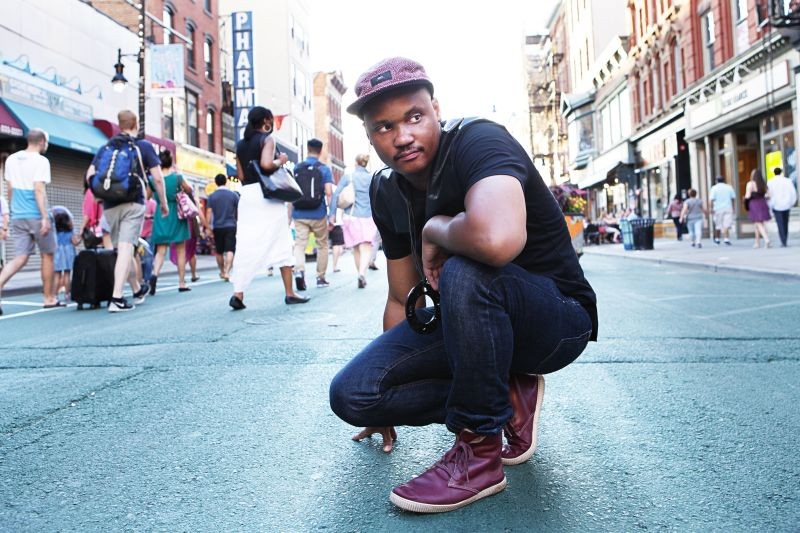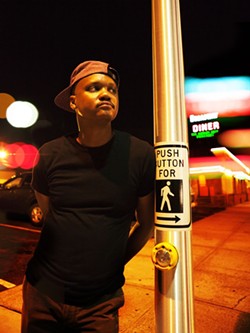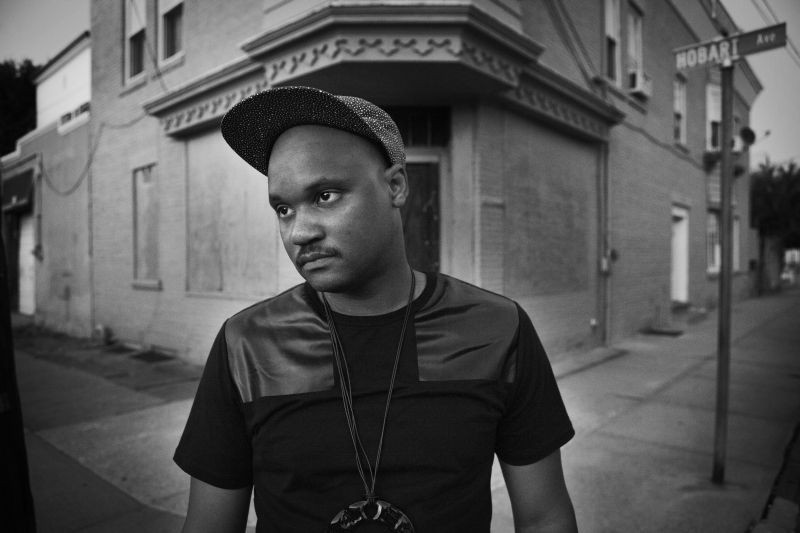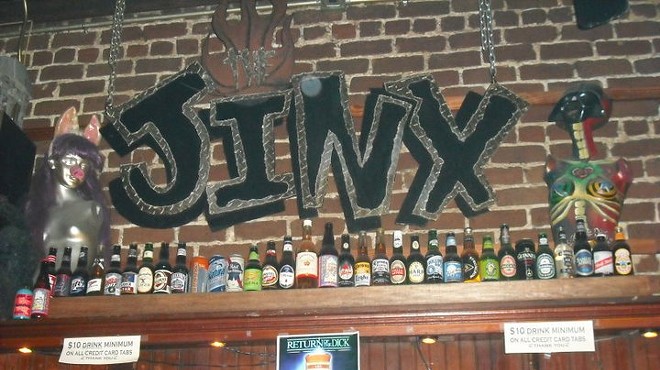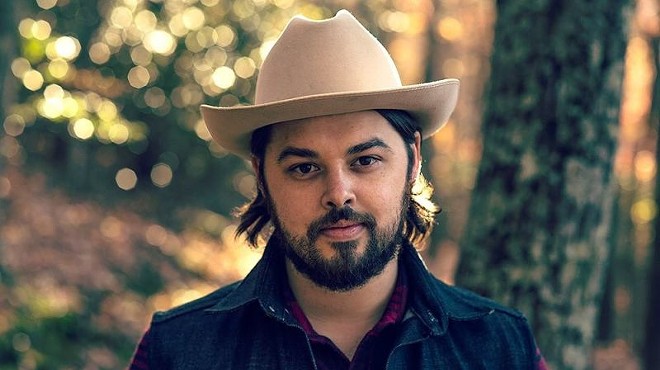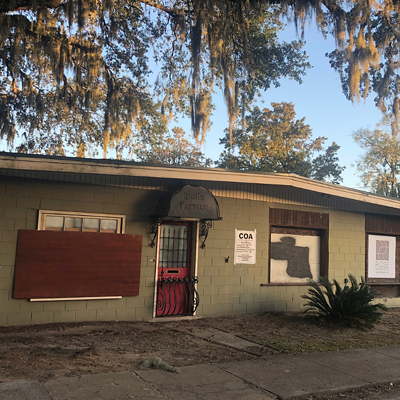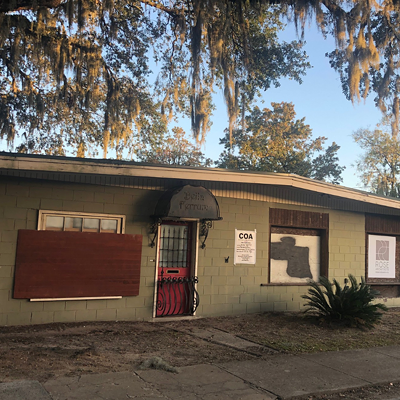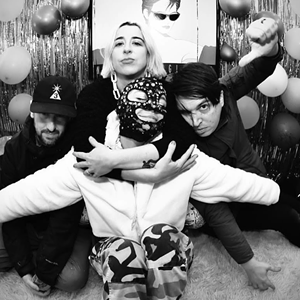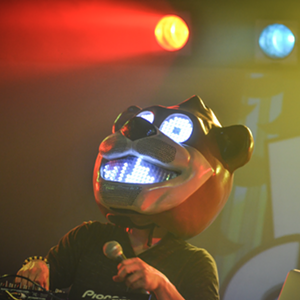THE LAST 18 months have been a whirlwind for Aaron Livingston, a.k.a. Son Little. While the rise of his nu-soul sound has been cited as an "overnight success," Livingston laughingly scoffs at the suggestion.
“That’s absolutely false,” he clarifies with a light laugh.
The Los Angeles native has been hard at work, pushing himself, collaborating, and getting his music out in the open for years. Sure, he’s on a slew of huge festival lineups this summer and has become an NPR favorite (he was even a judge for their annual Tiny Desk Contest), but he has put in the time to earn his spot as one of America’s hottest new artists.
As a kid, Livingston’s early musical sights were set on the saxophone; after some time exploring woodwinds, he eventually found his way to the bass guitar, dodging six-string guitar in the process (“Everyone wants to play guitar,” he notes wryly). As he moved to Manhattan and then Philadelphia to attend college, he got involved in the local music scenes, attending open mics and jams and sharing original sounds that, previously, hadn’t really made it out of his bedroom.
“I learned a lot,” Livingston says of a particular jam night he frequented. “In that time, I was hearing a lot of criticism...I was getting a little more confident, working away at it.”
As he learned more about improvisation, Livingston met and began collaborating with fellow Philadelphia residents The Roots. After earning a vocal credit for “Guns Are Drawn” on 2004 LP The Tipping Point, he contributed his talents to the iconic hip-hop/soul band’s 2011 album Undun.
Looking back, 2011 was a crucial year for Livingston’s career: in October, he teamed up with another Philadelphian, indie hip-hop artist RJD2, for an indie-funk project called Icebird (he’d previously lent his vocals to RJD2’s groovy “Crumbs Off The Table” in 2010). For RJD2, it was a significant release, earning the prolific musician praise for a new turn during a tepid time. Celebrated for its genre-blurring, the release had everyone asking, “Who is Aaron Livingston?” He answered in the form of an EP, Things I Forgot, the first music made as Son Little.
With stomp-claps, jangly percussion, vocals treated with a little vintage-radio grit, and bass-heavy guitar, the EP captured the now-definitive Son Little sound: timelessly catchy soul with a distinctly right-now feel. Daptone Records fans can gobble it up, and so can those RJD2 fanatics who dug the experimentation on Icebird’s The Abandoned Lullaby.
Son Little is often categorized as “new soul”—implying that soul music slipped away somewhere after its ‘60s-‘70s heyday.
The Rock and Roll Hall of Fame defines soul as “music that arose of out the black experience in America through the transmutation of gospel and rhythm & blues into a form of funky, secular testifying.”
There’s nothing inherently dated about the essence of soul music; its king, James Brown, may have passed on, but Livingston insists that our concept of what soul is, was, and should be is holding us back.
“To me, [soul music] just means that there’s no intent other than to express yourself. I think “nu-soul,” “neo-soul,” is sort of looking backwards. I don’t really think that soul music has a time; it’s about what you’re saying and how you’re feeling. I’ve learned things about music from things I heard in different eras, but I always want to look forward and express what’s in my heart right now.”
Throwback-style tracks pepper his Anti Records debut. “Lay Down” boasts gentle guitar and smooth, subtle organ strains under call-and-response vocals beckoning a sweetheart to get a little closer—it’s a perfect tune to kick off a romantic dinner and evening in. Songs like “O Mother” marry Livingston’s smooth croon and contemporary R&B touches to make a delicate slow-burner of a number.
“I came to Anti with a lot of songs,” Livingston says. “The idea was to polish and finish the demos, but I guess I get bored. I got restless, so I ended up kind of scrapping a bunch of stuff, starting from scratch. I just kind of started over. I think sometimes that’s easier, to write a new song than to fix an old one.”
The final results weren’t a total departure from the initial demos, but they captured a freshness that Livingston felt the originals were lacking.
“It’s not dissimilar,” he says. “I just think that it sort of adds some aha moments I wanted to capture in time. Even if I have a lot of songs people haven’t heard, they’ll be new to everyone else, but not me. But I like the feeling of releasing stuff I’m really excited about, too.”
Son Little’s live setup includes drums, bass, two guitars, and occasional synths handled by the drummer and bassist.
In creating a full-band sound, Livington says he’s “always been kind of the sort of anti-guitar player,” preferring technique that isn’t overshadowed by flash.
“I’m always drawn to the sounds of rhythm players as much as lead players,” he discloses. “Some of my favorite lead players, like Hendrix or Carlos Santana, they’re all great rhythm players. I think I naturally gravitate toward that.”
He likes to use the electric guitar’s versatility to its fullest, coaxing piano and organ-inspired sounds from the instrument.
“I have a good time playing around with that,” he adds.
With a crop of festival dates throughout summer (the band’s already enjoyed a benchmark performance at Austin City Limits and had a blast at Bonnaroo last year), Livingston promises that Son Little is ready to give The Jinx “one hundred and fifty percent” on their way to Atlanta’s Shaky Knees Festival.
No Son Little show is exactly alike; the frontman likes to make things interesting for himself and his audience.
“Some songs I’ll probably never sing the same way twice,” he says. “Sometimes, parts that were guitar parts become keyboard parts, those keyboard parts become guitar parts. It’s just a matter of feeling out what seems right for the players and what the song wants.”
What can Savannah expect from the rising star’s first Hostess City set?
“Come and find out,” Livingston invites slyly.

